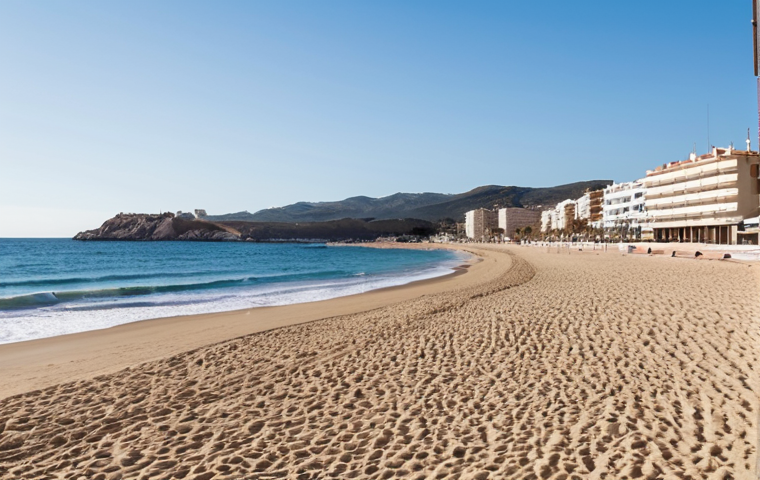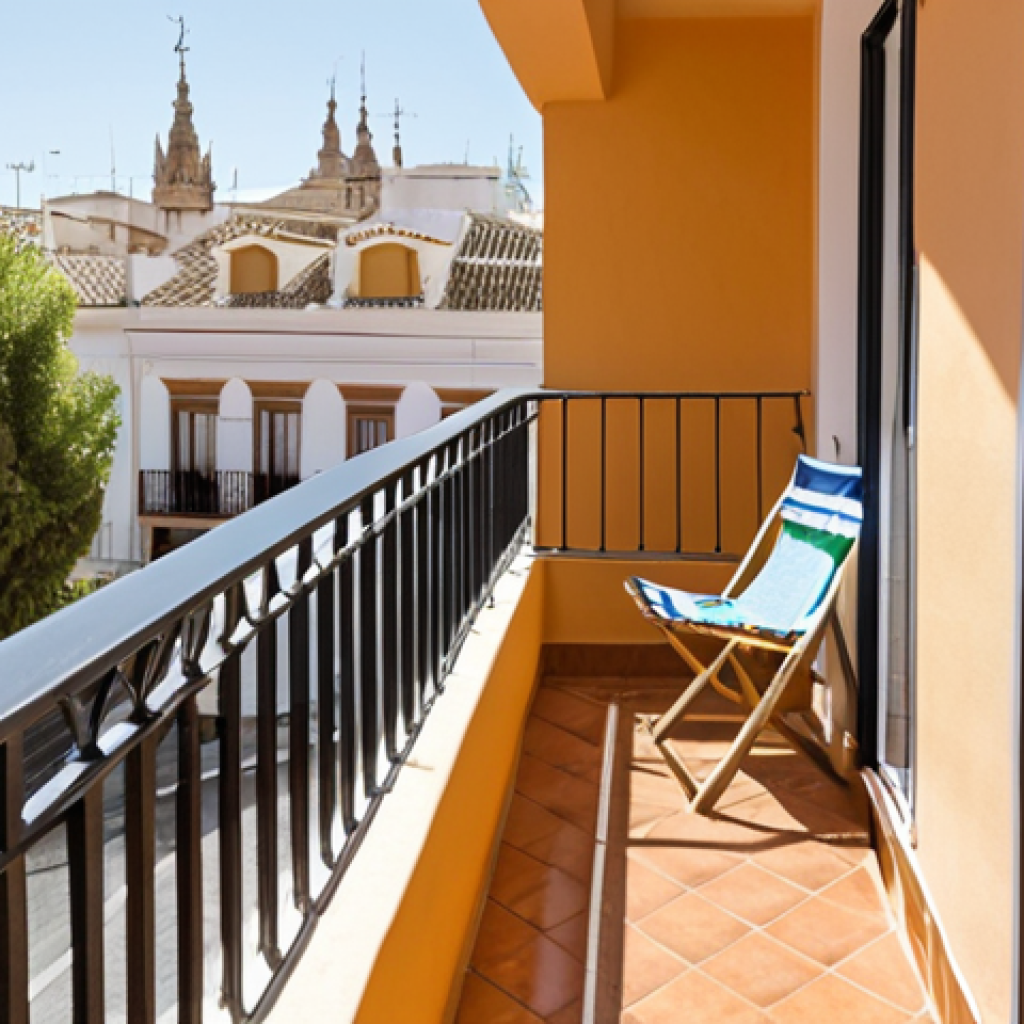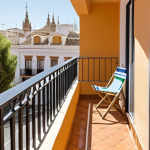So, you’re thinking about trading tapas for paella and making Spain your new home? Finding a place can feel like navigating a maze filled with charming but potentially confusing alleys.
From the bustling streets of Barcelona to the sun-drenched shores of Malaga, each region has its unique quirks when it comes to renting or buying. And trust me, I’ve been there, feeling utterly lost in translation while trying to decipher lease agreements!
The Spanish property market, much like the siesta, operates on its own rhythm, and getting a handle on it is key to finding your perfect casa. Let’s delve into the details so you know what to expect.
Navigating the Spanish Property Market: A Practical Guide
Unveiling the Rental Landscape: What to Expect

So, you’re ready to dive into the rental scene in Spain. Excellent choice! But before you start packing your bags and dreaming of sunny days, it’s good to get a grip on how things work here.
I remember my own initial shock when I realized that “furnished” can mean anything from a fully equipped apartment to a place with just a bed and a wardrobe.
It’s crucial to clarify these details upfront to avoid any surprises. One thing I wish I had known earlier is that rental contracts often require a “fiador,” which is essentially a guarantor.
If you don’t have a Spanish resident who can vouch for you, you might need to explore alternative options like a bank guarantee. Landlords here really value stability and assurance, and this is their way of getting it.
I remember when I was looking at apartments in Seville, the landlord seemed more interested in my job security than the apartment’s actual features!
Decoding Rental Agreements
When you’re presented with a rental agreement, don’t be afraid to ask questions, even if your Spanish is a bit rusty. It’s always better to be safe than sorry.
Pay close attention to the duration of the contract (usually one year, automatically renewable), the amount of the deposit (typically one or two months’ rent), and the conditions under which you can terminate the lease early.
There may be clauses about repairs, maintenance, and what happens if you damage the property.
Finding the Right Neighborhood
Madrid and Barcelona might be the first cities that pop into your mind, but don’t overlook other gems like Valencia, Seville, or even smaller towns along the coast.
Each offers a unique vibe and lifestyle. In Madrid, neighborhoods like Malasaña and La Latina are buzzing with energy, while Salamanca is more upscale and refined.
In Barcelona, Gràcia is known for its bohemian charm, while Eixample boasts stunning modernist architecture.
Becoming a Homeowner: A Step-by-Step Guide
So you have decided to take the plunge and purchase a property in Spain? Congratulations! It’s a big decision, but it can be incredibly rewarding.
Spain offers a diverse range of properties, from cozy apartments in city centers to sprawling villas in the countryside. Remember when I was first looking to buy, I almost made the mistake of buying a beachfront property without considering the winter months!
Coastal towns can feel very different in the off-season, so it’s important to visit at different times of the year before making a final decision.
Securing a Mortgage
Unless you’re paying cash (lucky you!), you’ll likely need a mortgage. Spanish banks generally offer mortgages to foreign residents, but the terms may be different from what you’re used to.
Expect to provide extensive documentation, including proof of income, bank statements, and tax returns. The amount you can borrow will depend on your financial situation, but typically ranges from 60% to 80% of the property’s value.
Interest rates can vary, so shop around and compare offers from different banks.
Navigating the Legal Process
The legal process of buying property in Spain involves several steps, including signing a preliminary contract (“contrato de arras”), obtaining a “NIE” (foreigner identification number), and finalizing the purchase at a notary.
It’s highly recommended to hire a lawyer to guide you through the process and ensure that everything is done correctly. Your lawyer will conduct due diligence on the property, review the contract, and represent you at the closing.
Understanding Taxes and Fees
Be prepared for additional costs beyond the purchase price of the property. These include property transfer tax (ITP), notary fees, land registry fees, and potentially a real estate agent’s commission.
The ITP rate varies depending on the region, but typically ranges from 6% to 10% of the property’s value. Also, keep in mind that you’ll be responsible for paying annual property tax (IBI) and potentially wealth tax (depending on the region and your assets).
Location, Location, Location: Choosing the Right Spot
The question of where to settle in Spain is a big one, and it really boils down to your personal preferences and lifestyle. I remember talking to expats who moved to Spain to retire, and some wanted the hustle and bustle of a big city while others preferred the peace and quiet of a small village.
Spain truly has something for everyone.
Coastal Charm vs. City Life
Do you dream of waking up to the sound of waves and spending your days lounging on the beach? Or do you prefer the vibrant energy of a bustling city with endless cultural attractions and nightlife?
Coastal areas like the Costa Brava, Costa del Sol, and the Canary Islands offer stunning beaches, warm weather, and a relaxed pace of life. However, they can be more seasonal, with some businesses closing down during the off-season.
Cities like Madrid, Barcelona, and Valencia offer a more diverse range of job opportunities, cultural experiences, and amenities.
Exploring Different Regions
Each region of Spain has its own unique character and charm. Catalonia is known for its modernist architecture, delicious cuisine, and independent spirit.
Andalusia boasts stunning Moorish architecture, flamenco dancing, and a laid-back lifestyle. The Basque Country offers dramatic coastlines, world-class gastronomy, and a strong cultural identity.
Madrid, as the capital, is a melting pot of cultures and a hub for business and entertainment.
Budgeting and Financing: Making Your Dream a Reality
Let’s face it, moving to Spain and finding a place to live involves money. It’s important to have a realistic budget and understand the costs involved.
I wish someone had warned me about the unexpected expenses that popped up along the way. It’s not just about the rent or mortgage payment; it’s also about utilities, insurance, transportation, and all the other little things that add up.
Calculating Your Expenses
Start by creating a detailed budget that includes all your expected expenses. This should include rent or mortgage payments, utilities (electricity, water, gas, internet), insurance (homeowner’s or renter’s insurance), transportation (car, public transport), food, entertainment, and any other recurring expenses.
Don’t forget to factor in one-time expenses like moving costs, furniture, and appliances.
Exploring Financing Options
If you’re not paying cash for your property, you’ll need to explore financing options. Spanish banks offer mortgages to foreign residents, but the requirements can be strict.
You’ll typically need to provide proof of income, bank statements, tax returns, and a credit report. The amount you can borrow will depend on your financial situation, but it’s generally lower than in other countries.
Essential Resources: Where to Find Help
Navigating a new country’s property market can feel overwhelming, especially if you’re not familiar with the language and customs. Fortunately, there are plenty of resources available to help you.
Online Portals and Real Estate Agents
Online property portals like Idealista and Fotocasa are great places to start your search. You can filter by location, price, size, and other criteria to find properties that match your needs.
However, keep in mind that many listings are managed by real estate agents, who will charge a commission for their services. If you prefer to work with an agent, choose one who specializes in working with foreign buyers and has a good reputation.
Legal and Financial Advice
As mentioned earlier, it’s highly recommended to hire a lawyer to guide you through the legal process of buying property in Spain. A lawyer will protect your interests, review contracts, and ensure that everything is done correctly.
You may also want to consult with a financial advisor to get advice on mortgages, taxes, and other financial matters.
| Aspect | Rental | Buying |
|---|---|---|
| Initial Costs | Deposit (1-2 months’ rent), first month’s rent | Deposit (10% of purchase price), taxes (ITP), notary fees, land registry fees |
| Monthly Costs | Rent, utilities | Mortgage payments, property tax (IBI), community fees (if applicable) |
| Legal Process | Signing a rental agreement | Signing a preliminary contract, obtaining a NIE, finalizing the purchase at a notary |
| Financial Requirements | Proof of income, guarantor (fiador) or bank guarantee | Proof of income, bank statements, tax returns, credit report |
Overcoming Language Barriers: Tips for Non-Spanish Speakers
The language barrier can be a challenge when dealing with real estate agents, landlords, and legal professionals. But don’t let it discourage you! There are several strategies you can use to overcome the language barrier and ensure that you understand everything that’s going on.
Taking Language Classes
The most obvious solution is to learn Spanish. Even a basic level of Spanish will make a huge difference in your ability to communicate with locals and navigate everyday situations.
Consider taking a language class or using online language learning apps like Duolingo or Babbel.
Using Translation Tools
If you’re not fluent in Spanish, translation tools can be a lifesaver. Google Translate is a good option for translating documents and websites. You can also use translation apps on your phone to communicate with people in real-time.
However, keep in mind that translation tools are not always accurate, so it’s always best to double-check the translation with a native speaker.
Avoiding Common Pitfalls: Lessons Learned
Throughout my experience, I’ve seen many expats make common mistakes when renting or buying property in Spain. Learning from these mistakes can save you time, money, and headaches.
Not Doing Your Research
One of the biggest mistakes you can make is not doing your research. Before you start looking at properties, take the time to learn about the Spanish property market, the different regions of Spain, and the legal and financial aspects of buying or renting.
Read articles, talk to other expats, and consult with professionals.
Rushing the Process
Finding the perfect home takes time, so don’t rush the process. Take your time to explore different neighborhoods, compare properties, and negotiate with sellers or landlords.
Don’t feel pressured to make a decision quickly, especially if you’re not comfortable with the terms of the deal. It’s always better to wait for the right opportunity than to settle for something that’s not a good fit.
Navigating the Spanish property market can seem daunting, but with the right preparation and a bit of local insight, it can be an incredibly rewarding experience.
Remember that quirky landlady in Seville who cared more about my job security than the size of the balcony? That’s Spain for you – a blend of traditional values and a laid-back approach to life.
Whether you’re dreaming of renting a cozy apartment in Barcelona or buying a sun-drenched villa on the Costa del Sol, take your time, do your research, and embrace the Spanish way of life.
¡Buena suerte!
Wrapping Up
So, there you have it – a comprehensive guide to navigating the Spanish property market. It’s been quite the journey, and I hope my experiences and tips have shed some light on what to expect. Remember, whether you’re renting or buying, the key is to be prepared, patient, and open to the unique charm of Spain. Now, go out there and find your perfect slice of Spanish paradise!
Handy Tips to Know
1. NIE Number: Before you even think about buying, get your NIE (Número de Identificación de Extranjero). It’s your tax identification number and essential for any financial transaction.
2. “Gestoría” Assistance: Consider hiring a “gestor,” an administrative professional who can handle paperwork and bureaucratic tasks. They’re worth their weight in gold when dealing with Spanish bureaucracy.
3. Understand “Community Fees”: If you’re buying an apartment, be aware of “comunidad” fees. These cover building maintenance, communal services, and can vary significantly.
4. Visit During Off-Season: If you’re considering a coastal property, visit during the off-season (winter) to see what the area is really like. Some towns become ghost towns outside of the summer months.
5. Negotiate! Don’t be afraid to negotiate, especially when buying. Spaniards expect some back-and-forth, so make your initial offer a bit lower than what you’re willing to pay.
Key Takeaways
* Rental vs. Buying: Renting provides flexibility, while buying is a long-term investment. Weigh the pros and cons based on your lifestyle and financial goals.
* Location is Key: Consider your priorities (beach, city, countryside) and choose a location that suits your lifestyle. * Budget Wisely: Factor in all costs, including taxes, fees, and unexpected expenses.
* Seek Professional Help: Hire a lawyer and a financial advisor to guide you through the process. * Embrace the Culture: Learn some basic Spanish and immerse yourself in the local culture to make your transition smoother.
Frequently Asked Questions (FAQ) 📖
Q: What’s the first thing I should do before even starting to look at apartments in Spain?
A: Honestly, before you get swept away by those dreamy photos of sun-drenched balconies, get your paperwork in order! I can’t stress this enough. You’ll need your NIE (Número de Identificación de Extranjero – Foreigner Identification Number), which is like a social security number for foreigners in Spain.
Applying for it can be a bit of a bureaucratic dance, so start early. Also, open a Spanish bank account. Many landlords prefer local accounts for rent payments.
I remember trying to use my American credit card for a deposit and got a very polite but firm “no.” Save yourself the hassle and get those essentials sorted first.
Q: I’ve heard mixed things about using real estate agents in Spain.
A: re they worth the cost? A2: That’s a tricky one, and it really depends on your personality and how comfortable you are navigating the Spanish system. I personally used an agent when I first moved because I was completely overwhelmed.
They can be incredibly helpful with translations (both linguistic and cultural!), negotiating, and finding properties that fit your specific needs. However, be prepared to pay a fee, usually a percentage of the rental price.
On the other hand, if you’re relatively fluent in Spanish, patient, and enjoy the hunt, you can definitely find great deals yourself by checking online portals and local listings.
Just remember, due diligence is key! Don’t be afraid to ask a million questions and get everything in writing.
Q: What are some common scams or pitfalls I should watch out for when renting in Spain?
A: Ah, the fun part! Unfortunately, like anywhere else, there are some shady characters lurking. Be wary of listings that seem too good to be true – they probably are.
Never, ever send money before seeing the property in person, or at least having a trusted contact check it out for you. I once almost fell for a scam where the “landlord” was supposedly out of the country and needed a deposit urgently.
Red flags galore! Also, make sure the rental contract is in writing and clearly outlines the terms, including the deposit amount, payment schedule, and responsibilities for repairs.
If possible, have a Spanish-speaking friend or a translator review it before you sign. Trust your gut, and if something feels off, walk away. There are plenty of legitimate places out there!
📚 References
Wikipedia Encyclopedia



